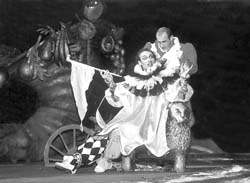Psychoanalysis a la Gogol

The stereotype of provincial theater as a bunch of loafers and actors that messed up onstage in the big city is rather firmly implanted in the Ukrainian mentality. For example, what quality show or career can one expect in Chernihiv with its 250,000 people? How could such a place offer either opportunity or potential? Many think so and could be right, but there is an exception to every rule.
Just as all roads lead to Rome, in Chernihiv the theatergoers are attracted by the regional Ukrainian musical drama theater. Last year, marking its 75th anniversary, the company was accorded academic status. And all this with the cast living in communal apartments, not being always paid their monthly 250 hryvnias on time, and without concert tours, which the company simply cannot afford. Simultaneously, they can surprise even the most exacting audience spoiled by visiting stars. Evidence of this is their recent premiere of Gogol’s Dead Souls. Many enthusiasts attended several performances to fully grasp the message. And well they should, as the cooperation between Gogol, Bulgakov, and producer Bakirov – so distant from one another in time – has begot an original interpretation of the classic story which fits into the overall depressed mood of the epoch quite nicely.
Dead Souls is a dramatic excursion in four dreams, unrealistic, surrealistic, fantastic, and lethargic. Andriy Bakirov says the concept of dreams was prompted by Gogol’s creative heritage as a whole, for it is thoroughly lethargic. The cast acts onstage very much in keeping with the original story, except for somewhat different accents. The producer’s approach betrays the influence of many schools of psychoanalysis. Thus, the dream reflecting subconscious trepidation, aspirations, and unrealized wishes is the leitmotif of this fantasy a la Gogol, images such as Chichikov’s Shadow and the Road, compelling the hero first to seek dead soul traders and then leading him to insanity, are akin to Jung. True, there are alternative phenomena, plenty of paradoxes, and the unexpected finale leaves the audience somewhat frustrated. The antihero, Chichikov, played by Serhiy Horshkov of the Chernihiv Youth Theater, begins to cause positive emotions, and empathy, especially in the finale when Bakirov shows the gradual transformation of Gogol’s antihero into a psychopath, and when an insane Chichikov identifies with his Shadow. Other characters are also transformed. The mendacious and boastful Node may well be associated with a sexual minority, courtesy of the producer; the niggardly Pliushkin (Valentyna Harkusha) appears to inhabit hell, and the image is complemented by the scythe- wielding Grim Reaper; Liza Manilova strongly resembles an ever cackling hen. In other words, the whole rendition is grotesque, shaking one’s habitual perception of Gogol’s Dead Souls learned at school. The Chernihiv cast shows them differently, with traits turning the classic into a mystery play.
Actors say that mystery onstage quickly and smoothly transforms itself into everyday life after ringing down the curtain. Among other things, the mirror and the shaving kit vanished before the premiere, while soundtrack cassettes also tend to disappear now and then. The private life of the actors playing the key roles has changed for the worse rather than better. They also say that this is evidence that the energy charging the plays affects not only the audience but also heavens. Kyiv theatergoers will be able to watch the play at a festival commemorating Nikolai Gogol’s bicentennial this April. But it is also true that taking a two hour ride to Chernihiv to watch it now is well worth the trouble.






